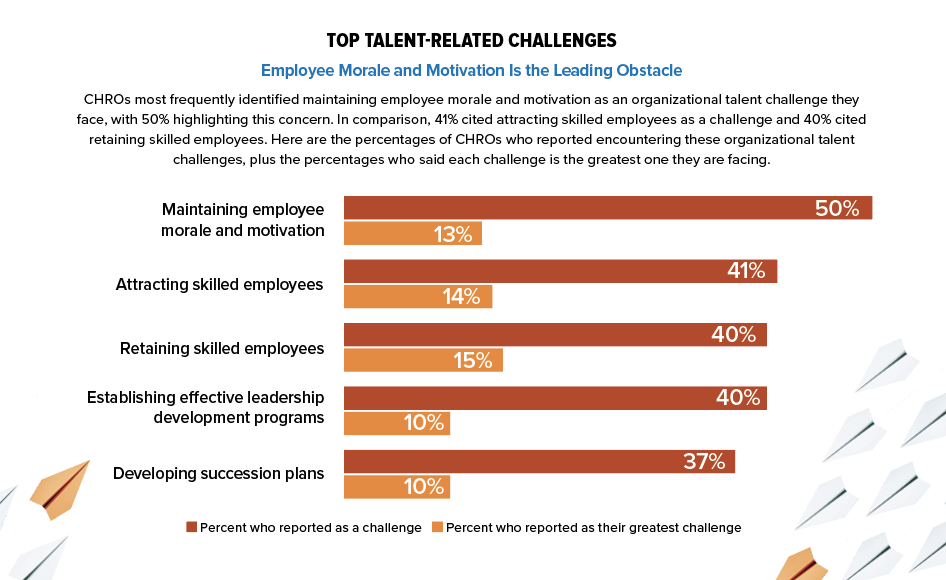The 2025 CHRO Agenda: Priorities and Challenges to Prepare for Tomorrow's Workforce
Research + Insights

As strategic leaders, CHROs play a central role in aligning human capital strategies with broader organizational goals. They also equip their organizations to anticipate and adapt to emerging challenges. SHRM’s new CHRO Priorities and Perspectives report examines the key strategic goals of CHROs in 2025, the range of challenges they face, and their visions for the future of work. The report was based on insights collected in December 2024 from 212 CHROs spanning diverse organization sizes and industries.





MESSAGE FROM THE RESEARCHERS
Brace for Impact: The Top Workplace Trends that CHROs Are Preparing For
What will the world of work look like throughout 2025 and beyond? For CHROs, this isn’t merely a speculative question. It’s a critical driver of daily strategic decisions.
As the workplace and HR function evolve, CHROs are uniquely positioned to shape the future of their organizations. However, their roles are becoming increasingly complex, requiring them to navigate rapid changes with agility and foresight. To stay ahead, CHROs must proactively align their strategies with the trends redefining the future of work.
SHRM’s recent CHRO Priorities and Perspectives report highlights the key workplace trends these leaders foresee and how they are preparing to face these challenges ahead.
CHROs Are Optimistic About the Role of AI
Artificial intelligence is the leading workplace trend that CHROs expect to gain traction in the future. An overwhelming 90% predict AI integration will become more prevalent in workplaces, with 87% confident it will boost workforce productivity and deliver broad organizational benefits.
Many CHROs also foresee AI playing a larger role in streamlining HR tasks and processes, underscoring its growing impact within the HR function. Beyond internal operations, CHROs predict AI will become more integral to workforce planning, influencing job requirements and taking on greater workloads within professional settings.
These results reflect CHROs’ strong confidence in AI’s growing impact on the workplace. Many see AI playing a pivotal role not only across the workforce but also within their own HR functions. As this technology evolves, staying ahead of trends will be crucial for CHROs to help their organizations leverage AI responsibly and effectively.

A Greater Emphasis on the Employee Experience
Amid the optimism around technology advancements, however, CHROs remain focused on preserving the human element of work. More than half (59%) expect an increased focus on employee well-being and mental health in 2025. In addition, 53% believe rapid skill development will be more prevalent, likely to help employees adapt alongside AI. Plus, 50% of CHROs anticipate an increasing emphasis on human-centered leadership, in which people’s needs and an inclusive workplace are prioritized.
These trends indicate that as advanced technologies take on a greater role in the workplace, CHROs remain bullish on the human element. This dual emphasis on technological innovation and people-first strategies positions CHROs as pivotal leaders for facing change.
The challenge lies in seamlessly integrating AI’s capabilities while safeguarding the human side of work to ensure that digital advancements complement, rather than overtake, the unique strengths of today’s workforce.
How CHROs Are Preparing for Change
To lead organizations in responsibly integrating AI while preserving human-centric needs, many CHROs are prioritizing two core areas: leadership and manager development and organizational change initiatives. These priorities, highlighted in the report, are pivotal for driving meaningful, lasting transformation.
By empowering leaders and managers to excel in their roles and embrace uncertainty, CHROs are fostering resilience and positioning their organizations for long-term success in an era of rapid change. Concurrently, strategic change management initiatives are enabling organizations to effectively adapt and thrive amid technological advancements, particularly with the increasing adoption of AI.
Research from SHRM in early 2025 showed that HR professionals think HR should lead or play a significant role in technology-driven changes, including employee adoption and training. As strategic leaders, CHROs are at the forefront of this transformation, ensuring their organizations not only anticipate change but also proactively build strong, flexible workforces prepared to meet the demands of the future of work.

DERRICK SCHEETZ is a lead researcher at SHRM.


